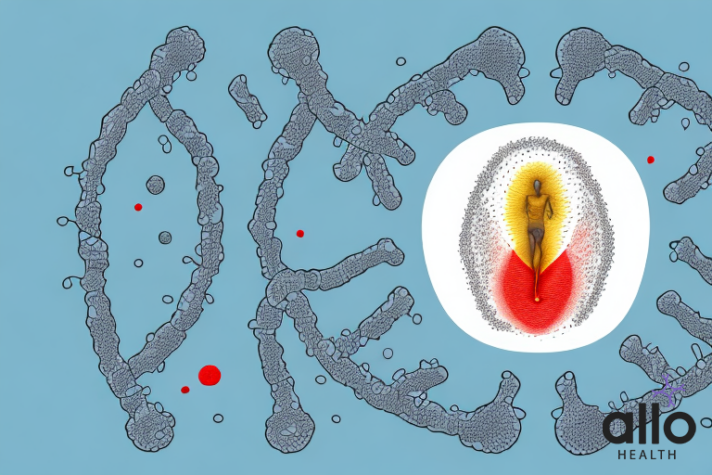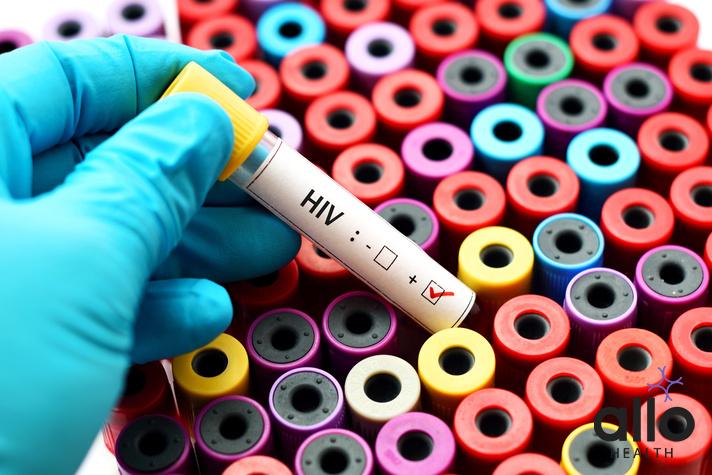What Is HIV Wasting Syndrome?

Allo Health is dedicated to personalized well-being, offering support and trusted information tailored to individual health goals. The platform emphasizes human-generated content, led by a distinguished medical team of experts, including physicians and sexual health specialists. Their commitment to credibility involves rigorous fact-checking, authoritative research, and continuous updates to ensure accurate, up-to-date information. Allo Health's unique approach goes beyond conventional platforms, providing expert-led insights and a continuous commitment to excellence, with user feedback playing a crucial role in shaping the platform's authoritative voice.

Dr. Aditi completed her undergraduate medical education at AJIMS, Mangalore, after which she worked in multi-speciality hospitals with COVID patients and in the Pain and Palliative medicine department. Driven by her experiences, she developed a keen interest in psychiatry. Dr. Aditi believes that mental health is just as, if not more important, than physical health.
Why This Was Upated?
Our experts continually monitor the health and wellness space, and we update our articles when new information became available.
Updated on 11 February, 2024
- Article was updated as part of our commitment to diversity, equity, and inclusion.

"The following blog article provides general information and insights on various topics. However, it is important to note that the information presented is not intended as professional advice in any specific field or area. The content of this blog is for general educational and informational purposes only.
Book consultation
The content should not be interpreted as endorsement, recommendation, or guarantee of any product, service, or information mentioned. Readers are solely responsible for the decisions and actions they take based on the information provided in this blog. It is essential to exercise individual judgment, critical thinking, and personal responsibility when applying or implementing any information or suggestions discussed in the blog."
If you or someone you care about is living with HIV, you may have heard about a condition called HIV wasting syndrome. This condition is characterized by unintended weight loss, muscle wasting, and weakness, and it can significantly impact a person’s quality of life. However, there are effective treatment options available that can help manage HIV wasting syndrome and improve overall health and well-being. In this article, we will take an in-depth look at what HIV wasting syndrome is, its symptoms and causes, who is at risk, and the various treatment options available.
HIV Wasting Syndrome Causes
HIV wasting syndrome, also known as HIV-associated wasting or cachexia, refers to the involuntary loss of weight, muscle mass, and fat tissue in individuals with HIV/AIDS. This condition is characterized by a significant and unintentional decline in body weight, often accompanied by weakness, fatigue, and a general decline in overall health. Several factors contribute to the development of HIV wasting syndrome:
- HIV Infection: The direct impact of the human immunodeficiency virus (HIV) on the body plays a crucial role in wasting syndrome. HIV attacks and impairs the immune system, making the body more susceptible to opportunistic infections and other complications.
- Chronic Inflammation: HIV infection triggers a chronic state of inflammation in the body. Persistent inflammation can lead to metabolic changes, increased energy expenditure, and a catabolic state (breaking down of tissues), contributing to muscle and weight loss.
- Malabsorption of Nutrients: HIV can affect the gastrointestinal tract, leading to malabsorption of nutrients. This means that the body may not absorb essential nutrients from food efficiently, resulting in nutritional deficiencies that contribute to weight loss.
- Opportunistic Infections: People with HIV are more susceptible to opportunistic infections, which can affect the gastrointestinal system and interfere with nutrient absorption. Chronic diarrhea, for example, can lead to a loss of fluids and nutrients.
- Metabolic Changes: HIV infection can disrupt normal metabolic processes, leading to changes in how the body utilizes energy and nutrients. This altered metabolism can contribute to the breakdown of muscle and fat tissues.
- Decreased Appetite: HIV and its associated complications, such as infections and medications, can lead to a decreased appetite. This reduced intake of calories contributes to weight loss and muscle wasting.
- Cytokine Dysregulation: HIV infection can dysregulate the production of cytokines, which are signaling molecules involved in the immune response. Imbalances in cytokine levels can contribute to inflammation and muscle wasting.
- Side Effects of Medications: Antiretroviral medications, while crucial for managing HIV, may have side effects that contribute to weight loss. For example, nausea, vomiting, and changes in taste perception can affect dietary intake.
- Psychosocial Factors: The psychosocial impact of living with HIV/AIDS, including stigma, depression, and anxiety, can contribute to changes in appetite, nutritional status, and overall well-being.
- Cancer: Some individuals with HIV may develop HIV-associated cancers, such as Kaposi’s sarcoma or lymphoma, which can contribute to weight loss and wasting.
It’s important to note that the management of HIV wasting syndrome involves a comprehensive approach, including antiretroviral therapy to control HIV, nutritional support, and treatment of opportunistic infections. Additionally, addressing psychosocial factors and providing supportive care are essential components of managing this condition. Individuals with HIV should work closely with healthcare professionals to develop a tailored and effective treatment plan.

HIV Wasting Syndrome Symptoms
HIV wasting syndrome is characterized by a range of symptoms related to involuntary weight loss, muscle atrophy, and overall decline in health. These symptoms can significantly impact an individual’s quality of life and may be indicative of an advanced stage of HIV/AIDS. Here are detailed descriptions of the symptoms associated with HIV wasting syndrome:
- Unintentional Weight Loss: One of the primary symptoms of HIV wasting syndrome is the significant and involuntary loss of body weight. This weight loss may be progressive and not easily explained by changes in diet or physical activity.
- Muscle Atrophy: Individuals with HIV wasting syndrome often experience muscle wasting, which involves the loss of muscle mass. This can lead to weakness, reduced strength, and impaired physical function.
- Fatigue and Weakness: Ongoing weight loss and muscle wasting contribute to feelings of fatigue and weakness. Individuals may experience a decline in stamina and may find even routine activities challenging.
- Loss of Appetite: A decrease in appetite is a common symptom of HIV wasting syndrome. This may be due to the direct effects of HIV on the body, side effects of medications, or the presence of opportunistic infections affecting the gastrointestinal system.
- Nutritional Deficiencies: Malabsorption of nutrients, a common concern in individuals with HIV, can lead to nutritional deficiencies. This may manifest as specific symptoms related to the lack of essential vitamins and minerals, such as anemia, bone disorders, or neurological symptoms.
- Chronic Diarrhea: Gastrointestinal complications, including chronic diarrhea, can contribute to fluid and nutrient loss, exacerbating the weight loss associated with HIV wasting syndrome.
- Changes in Body Composition: HIV wasting syndrome can lead to changes in body composition, including a decrease in lean body mass and an increase in body fat percentage. These changes are often associated with a decline in overall health.
- Fever and Night Sweats: Persistent or recurrent fever and night sweats may be present, indicating the presence of opportunistic infections or an elevated inflammatory response.
- Dehydration: The combination of diarrhea, decreased fluid intake due to loss of appetite, and increased metabolic demands can contribute to dehydration.
- Psychosocial Symptoms: Living with HIV and experiencing the physical manifestations of wasting syndrome can have psychological and emotional effects. Depression, anxiety, and a sense of hopelessness may be present.
It’s important to note that these symptoms can vary in severity among individuals, and some people may not experience all of them. Additionally, the symptoms of HIV wasting syndrome may overlap with those of other conditions, making a comprehensive medical evaluation essential for accurate diagnosis and appropriate management. Timely intervention, including antiretroviral therapy, nutritional support, and addressing opportunistic infections, can help manage and improve the symptoms of HIV wasting syndrome. Individuals experiencing these symptoms should seek medical attention promptly.
HIV Wasting Syndrome Treatment
The treatment of HIV wasting syndrome involves a comprehensive approach that addresses the underlying causes of weight loss, muscle wasting, and overall decline in health. The primary goals of treatment are to control the HIV infection, manage opportunistic infections, improve nutritional status, and enhance overall well-being. Here are the key components of HIV wasting syndrome treatment in detail:
- Antiretroviral Therapy (ART): Antiretroviral drugs are the cornerstone of HIV treatment. They work by suppressing the replication of the virus, reducing viral load, and preserving immune function. Effective ART can help control HIV-related complications, including wasting syndrome.
- Nutritional Support: Adequate nutrition is crucial for managing HIV wasting syndrome. A registered dietitian or nutritionist can develop a personalized nutrition plan to address nutrient deficiencies and promote weight gain. This may involve a combination of dietary counseling, oral nutritional supplements, and, in severe cases, tube feeding or intravenous nutrition.
- Treatment of Opportunistic Infections: Opportunistic infections, which are common in individuals with advanced HIV/AIDS, can contribute to weight loss and muscle wasting. Treating these infections with appropriate antimicrobial medications is essential for managing HIV wasting syndrome.
- Exercise and Physical Therapy: Regular physical activity, tailored to the individual’s abilities, can help maintain muscle mass and strength. Physical therapy may be recommended to address specific muscle weaknesses and improve overall functional capacity.
- Hormone Therapy: Hormonal imbalances, such as low testosterone levels (hypogonadism), are common in individuals with HIV wasting syndrome. Hormone replacement therapy may be considered to address these imbalances and improve muscle mass.
- Symptomatic Treatment: Medications may be prescribed to manage specific symptoms associated with HIV wasting syndrome, such as appetite stimulants to address decreased food intake, antiemetics to control nausea, and pain management for muscle discomfort.
- Psychosocial Support: Addressing the psychosocial aspects of living with HIV/AIDS is essential. Mental health support, counseling, and support groups can help individuals cope with the emotional and psychological impact of HIV wasting syndrome.
- Monitoring and Follow-Up: Regular medical monitoring is crucial to assess the effectiveness of treatment and adjust interventions as needed. Monitoring includes tracking weight, muscle mass, nutritional status, and response to antiretroviral therapy.
- Prevention of Complications: Preventive measures, such as vaccinations against common infections and prophylactic antibiotics, may be recommended to reduce the risk of opportunistic infections and complications.
- Collaborative Care: A multidisciplinary approach involving healthcare professionals from various fields, including infectious disease specialists, dietitians, physical therapists, and mental health professionals, is essential for comprehensive care.
It’s important to tailor the treatment plan to the individual’s specific needs, considering factors such as the severity of symptoms, coexisting conditions, and treatment response. Timely intervention and ongoing medical management are crucial for improving outcomes and enhancing the overall quality of life for individuals with HIV wasting syndrome. Individuals should work closely with their healthcare team to develop a personalized and effective treatment plan.
HIV Wasting Syndrome Prevention
Preventing HIV wasting syndrome involves a combination of strategies aimed at managing HIV infection, maintaining overall health, and addressing factors that contribute to weight loss and muscle wasting. Here are detailed measures for preventing HIV wasting syndrome:
- Early Diagnosis and Treatment of HIV: Early detection of HIV infection is crucial for initiating timely treatment with antiretroviral therapy (ART). Effective ART can suppress viral replication, preserve immune function, and reduce the risk of complications, including wasting syndrome.
- Adherence to Antiretroviral Therapy (ART): Strict adherence to prescribed antiretroviral medications is essential for controlling HIV replication and preventing the progression of the disease. Consistent and proper use of ART helps maintain immune function and reduces the risk of complications.
- Regular Medical Monitoring: Routine medical check-ups are important for monitoring overall health, immune function, and the effectiveness of antiretroviral therapy. Regular monitoring allows healthcare professionals to identify and address potential complications early.
- Nutritional Counseling and Support: Early and ongoing nutritional counseling can help individuals with HIV maintain a healthy diet and address nutritional deficiencies. Adequate caloric intake and proper nutrient balance are essential for preventing weight loss and muscle wasting.
- Physical Activity: Regular exercise, tailored to an individual’s abilities, can help maintain muscle mass and improve overall physical health. Physical activity can also contribute to a sense of well-being and improve energy levels.
- Prevention of Opportunistic Infections: Immunizations against preventable infections, such as pneumonia and influenza, can help reduce the risk of opportunistic infections. Prophylactic antibiotics may be recommended for certain individuals to prevent specific infections.
- Addressing Gastrointestinal concerns: Managing gastrointestinal symptoms, such as diarrhea and malabsorption, is important for preventing nutrient loss. Antidiarrheal medications and dietary modifications may be recommended.
- Hormone Management: Monitoring hormone levels, such as testosterone, and addressing imbalances through hormone replacement therapy, if necessary, can help prevent muscle wasting.
- Psychosocial Support: Addressing mental health and psychosocial factors is crucial for overall well-being. Support groups, counseling, and mental health services can help individuals cope with the emotional and psychological challenges associated with HIV.
- Adequate Hydration: Maintaining proper hydration is important, especially if individuals experience symptoms like diarrhea. Dehydration can exacerbate weight loss and weaken the body.
- Avoiding Substance Abuse: Substance abuse can have negative effects on overall health and exacerbate the complications associated with HIV. Avoiding the misuse of drugs and alcohol is important for preventing further health decline.
- Regular Dental Care: Proper oral hygiene and regular dental check-ups are important for preventing oral health concerns, which can contribute to nutritional deficiencies and weight loss.
- Education and Empowerment: Providing education about HIV, its management, and lifestyle choices empowers individuals to take an active role in their health. Informed individuals are more likely to adhere to treatment plans and make healthy lifestyle choices.
Preventing HIV wasting syndrome requires a comprehensive and individualized approach. Individuals living with HIV should work closely with their healthcare team to develop a personalized prevention plan that addresses their specific needs and circumstances. Regular communication with healthcare providers and adherence to medical recommendations are crucial components of effective prevention strategies.
Most Asked Questions
-
What is HIV Wasting Syndrome?
HIV Wasting Syndrome, also called HIV-related wasting, is a circumstance characterised via involuntary weight reduction, muscle atrophy, and basic decline in health in individuals dwelling with HIV/AIDS. It frequently alerts a sophisticated degree of the disorder and might appreciably impact someone's excellent of life.
-
What Causes HIV Wasting Syndrome?
HIV Wasting Syndrome is because of a aggregate of factors, including the direct impact of the HIV virus at the immune machine, chronic irritation, malabsorption of vitamins, opportunistic infections, metabolic changes, decreased urge for food, and psychosocial factors. These factors make contributions to weight reduction, muscle losing, and other signs associated with the syndrome.
-
How is HIV Wasting Syndrome Diagnosed?
Diagnosis of HIV Wasting Syndrome involves a thorough clinical assessment, along with assessing weight reduction, muscular tissues, and basic fitness. Blood exams may be conducted to assess nutritional repute, immune feature, and the presence of opportunistic infections. Imaging studies and other diagnostic tools will also be used to evaluate frame composition.
-
Can HIV Wasting Syndrome be Prevented?
Yes, HIV Wasting Syndrome can be prevented via early diagnosis and remedy of HIV with antiretroviral remedy (ART). Adherence to prescribed medicinal drugs, everyday scientific monitoring, nutritional counseling, bodily interest, and addressing psychosocial elements are critical additives of prevention. Avoiding substance abuse and keeping typical health contribute to prevention efforts.
-
What is the Treatment for HIV Wasting Syndrome?
Treatment for HIV Wasting Syndrome involves a complete method. It consists of antiretroviral therapy (ART) to govern HIV, dietary guide, control of opportunistic infections, exercise, hormone therapy if needed, and psychosocial support. Regular scientific monitoring and collaborative care from healthcare professionals are critical for effective treatment and improving general nicely-being.






































